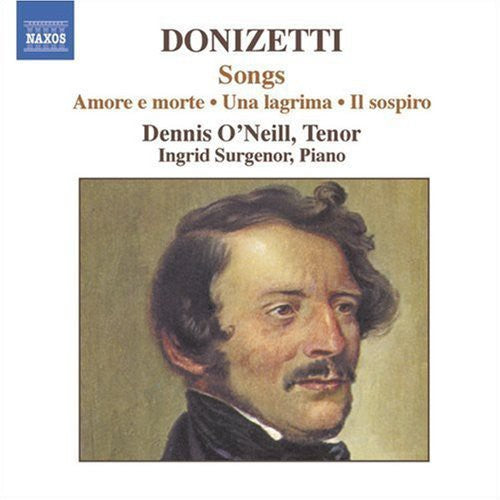Naxos
Donizetti/ O'Neill/ Surgenor - Songs
Donizetti/ O'Neill/ Surgenor - Songs
Usually ships within 1 to 2 weeks.
Couldn't load pickup availability
SKU:NXS8557780.2
Share
The present recording includes items from a Collezione Di Canzonette probably published during the 1820s and containing five solo songs, three duets and an unaccompanied quintet. 'Giuro d'amore' [Track 9], a simple heart-felt avowal of love, is remarkable in making a perfectly rounded musical statement with no element of thematic recurrence. 'Su l'onda tremola' [7], an invitation to the hesitant beloved to take a trip on the Venetian lagoon, is laid out as a rondo, each reprise varied with light touches of fioritura. 'Le crépuscule' [12] is taken from Nuits d'été à Posillipo, this last a resort north of Naples, famous for it's hot springs (1836). Described as a 'romanza', it is in fact an 'aubade', the twilight being that of morning. Hugo's three verses are set to different melodic ideas, each of which returns quite naturally to the same refrain for the lover who 'sings and weeps'. Of the three 'ariette' from Soirées D'Automne à L'Infrascati (now a Neapolitan suburb) 'Amore e morte' [1] sustains an elegiac mood throughout with only the faintest hint of consolation in it's major-key conclusion; 'La Lontananza' [13] allows cheerfulness to break in towards the end; 'Amor Marinaro' [5] is one of those joyous ditties in Neapolitan dialect in which Donizetti excelled - so much so that he was for a long time wrongly credited with the once popular favorite, 'Te Voglio Bene Assje', still occasionally heard today. From Inspirations Viennoises (1842), 'Il sospiro' [10] bears witness to the composer's enduring capacity for long-breathed cantilena in the Italian Romantic manner; while 'È morta' [6] inscribed to Zélie de Coussy (future dedicatee of Don Pasquale and thought to have been more than a mere friend) features a highly original distribution of minor and major modes. For her too Donizetti wrote, to a French text, the most poignant of all his salon pieces 'La mère et l'enfant' [4] which remains centred in a minor key throughout.



